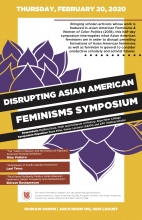What is Asian American Feminisms? Bringing scholar-activists whose work is featured in Asian American Feminisms & Women of Color Politics (2018), this half-day symposium ponders this question in order to disrupt prevailing formations of Asian American feminisms as well as feminism in general to consider productive scholarly and activist futures. Participants will consider questions such as:
- How do racialized gender oppressions impact Asian America?
- How have diasporic frameworks limited our analysis and our politics?
- How do settler colonial frameworks impact the lived experiences of certain AAPI communities and shape organizing efforts?
- How may we move beyond visibility and inclusion as goals? What project should we pursue?
- What contributions does Asian American Feminisms offer Women of Color Politics?
- What might an Asian American feminist coalitional politics look like?
Schedule
10-10:15am Coffee & Registration
10:15-10:30 Welcome & Introduction
10:30-10:50 The ‘Traffic in Women’ and the Politics of Filipina/o American Feminist Solidarity with Gina K. Velasco, Gettysburg College
10:50-11:10 Genealogies of Pacific Islander Feminisms with Lani Teves, University of Hawaiʻi at Mānoa
11:10-11:30 Third Space Solidarity Politics: Asian American Feminisms, Settler Complicity and Antiblacknesss with Shireen Roshanravan, Kansas State University
11:30-12 Q&A
12-1pm Lunch
“The ‘Traffic in Women’ and the Politics of Filipina/o American Feminist Solidarity.”
Gina Velasco
Assistant Professor, Women, Gender, and Sexuality Studies Program
Gettysburg College
Gina K. Velasco is an assistant professor in the Women, Gender, and Sexuality Studies Program at Gettysburg College. She holds a Ph.D. in the History of Consciousness and Feminist Studies from the University of California at Santa Cruz. Her research and teaching explore how gender and queer sexuality inform notions of nation, diaspora, and transnational belonging in a contemporary context of globalization. Her writing has been published in the journals, Women and Performance: A Journal of Feminist Theory, the International Feminist Journal of Politics, and the Review of Women's Studies, as well as the edited collection, Asian American Feminisms and Women of Color Politics (University of Washington Press, 2018). She is the author of Queering the Global Filipina Body: Contested Nationalisms in the Filipina/o Diaspora (University of Illinois Press, 2020).
Genealogies of Pacific Islander Feminisms
Lani Teves
Assistant Professor, Women’s Studies
University of Hawaiʻi at Mānoa
Lani Teves, Kanaka Maoli (Native Hawaiian) from Ewa Beach, Oʻahu, is an assistant professor of women’s studies at the University of Hawaiʻi at Mānoa. She is co-editor of Native Studies Keywords and author of Defiant Indigeneity: The Politics of Hawaiian Performance.
Third Space Solidarity Politics: Asian American Feminisms, Settler Complicity and Antiblacknesss
Shireen Roshanravan
Associate Professor, American Ethnic Studies
Kansas State University
Shireen Roshanravan is associate Professor in the Department of American Ethnic Studies, and affiliated faculty member in Gender, Women, and Sexuality Studies. She works at the intersection of Women of Color coalition politics, decoloniality, critical race and feminist/queer of color theory, comparative ethnic and Asian American studies. Shireen is co-editor of two books: Asian American Feminisms and Women of Color Politics (University of Washington Press, 2018) and Speaking Face-to-Face: The Visionary Philosophy of María Lugones (SUNY Press, June 2019). Her current book project is tentatively titled The Coalitional Imperative: Political Integrity at the Limits of Queer Rupture.
Rupa Pillai (Symposium Organizer)
Senior Lecturer, Asian American Studies Program
University of Pennsylvania
Rupa Pillai is a senior lecturer of Asian American Studies at the University of Pennsylvania. She received a MA in Social Sciences from the University of Chicago and a PhD in Cultural Anthropology from the University of Oregon. Her dissertation, Caribbean Hinduism on the Move, is the culmination of 15 months of ethnographic fieldwork with the growing Indo-Caribbean American community in New York City. Through this research, she explores how this community adapts and mobilizes Hinduism in this second migration, first from the Indian subcontinent and second from the Caribbean, to carve a space for themselves within the social landscape of New York City.

 The Program in Gender, Sexuality, and Women’s Studies
The Program in Gender, Sexuality, and Women’s Studies